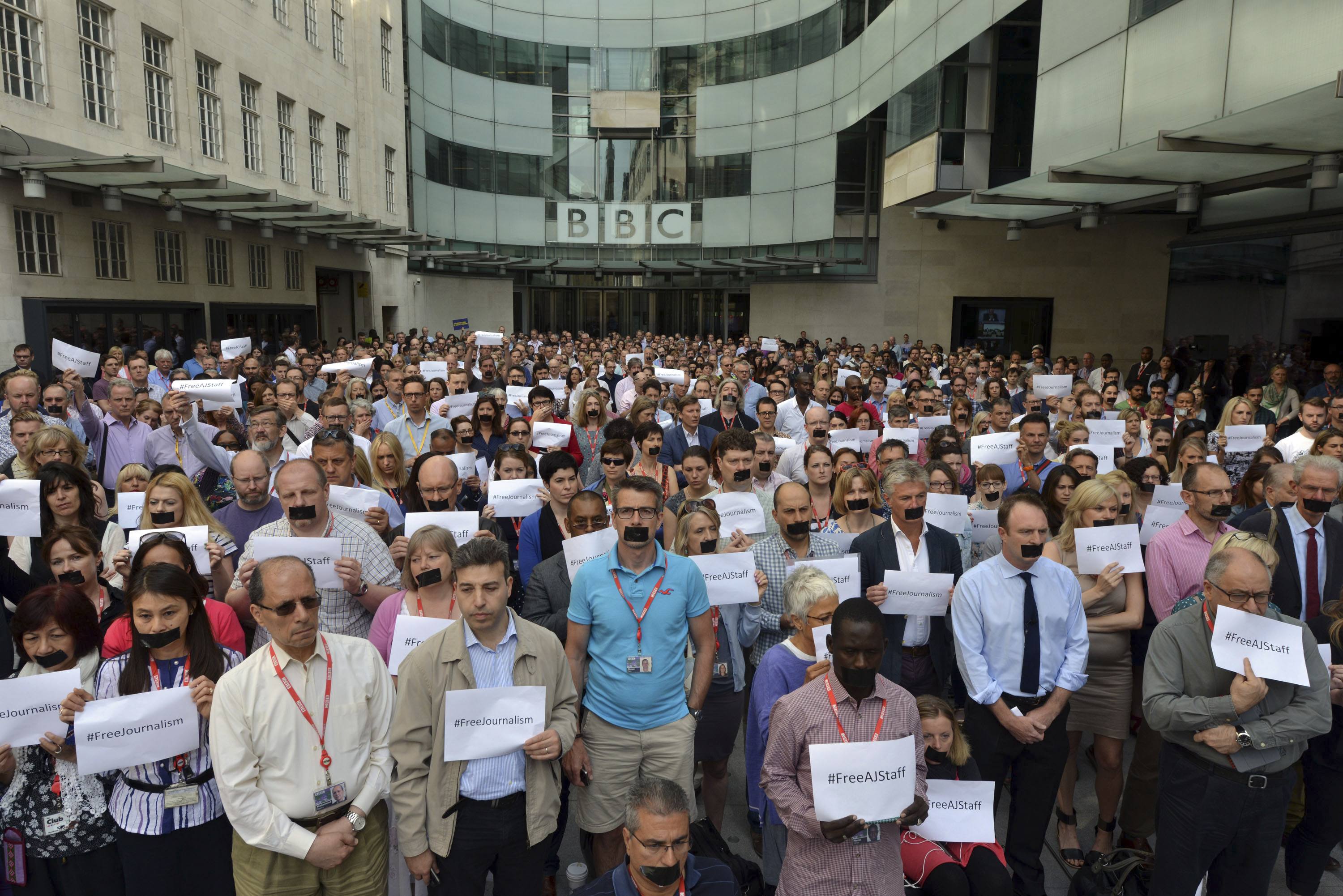Latest NEWS
- Aswat Masriya, the last word
- Roundup of Egypt's press headlines on March 15, 2017
- Roundup of Egypt's press headlines on March 14, 2017
- Former Egyptian President Hosni Mubarak to be released: lawyer
- Roundup of Egypt's press headlines on March 13, 2017
- Egypt's capital set to grow by half a million in 2017
- Egypt's wheat reserves to double with start of harvest -supply min
- Roundup of Egypt's press headlines on March 12, 2017
184 violations against foreign journalists in Egypt since January 2011 – rights group

British Broadcasting Corporation (BBC) staff and journalists protest the imprisonment in Egypt of Al Jazeera journalists Peter Greste, Mohamed Fahmy and Baher Mohamed, by taping up their mouths outside New Broadcasting House in London, June 24, 2014 in this handout photograph released by the BBC.
CAIRO, Nov 10 (Aswat Masriya) – Foreign journalists operating in Egypt have faced 184 violations since the January 2011 uprising which toppled former President Hosni Mubarak, a rights group said on Monday.
The Cairo-based Association for Freedom of Thought and Expression (AFTE) released a report on the conditions under which foreign journalists operate in Egypt. The report concludes that foreign journalists face violations on an almost daily basis.
Most violations faced by foreign journalist took place during the 18-day 2011 uprising.
AFTE reported 104 violations between January 25 and February 11, 2011. Violations included: assault, raids, detention, kidnap, threats, arrest, confiscating and destroying equipment and sexual assault.
Ranking second in the frequency of violations is the period which followed the ouster of Islamist President Mohamed Mursi in July 2013.
Sixty-one violations were reported since protests against Mursi's rule on June 30, 2013 and until October 2014. They include: assault, detention, arrest, imprisonment, confiscation of equipment and sexual assault.
Mursi's tenure, from June 2012 to June 2013, witnessed 10 violations against foreign journalists, AFTE said. They ranged from assault to detention, murder, rape and sexual assault.
The smallest number of violations exercised against foreign journalists since the 2011 uprising was recorded during the tenure of the Supreme Council of the Armed Forces (SCAF), from February 2011 until June 2012. Nine violations were reported, including assault, detention and sexual assault.
"The report is released at a time when journalists in Egypt face unprecedented hardships and challenges," read an AFTE statement released on Monday. "This comes in light of the proliferation of a speech hostile to the freedom of the press and the media. Such speech is supported by media outlets' administrations which endorse state policies and the anti-terrorism measures they adopt."
Two weeks ago, a group of chief editors of Egypt's most prominent state-owned and private newspapers signed a declaration where they vowed to "stop the publishing of statements which support terrorism and call for restricting state institutions directly or indirectly."
The head of Egypt's Journalists' Syndicate, Diaa Rashwan, was among the declaration's signatories.
The declaration was widely condemned by rights activists and independent journalists. Over 600 domestic journalists signed a petition saying that the declaration does not represent them.
AFTE's report also cited the "daily hardships" faced by foreign journalists and correspondent while carrying out their duties. It mentioned the difficulty they face in gaining access to information and the lack of cooperation they encounter from state institutions.
AFTE also referred to the difficult process of acquiring licenses for foreign journalists and questioned whether such licenses provide the journalists with the necessary security and legal protection.
A criminal court sentenced three journalists from Qatari news network Al-Jazeera to seven years in prison on June 23 on charges of defaming Egypt and spreading false news in the case known as the “Marriott Cell”.
The three defendants are Australian award-winning journalist Peter Greste, Egyptian-Canadian former BBC producer Mohamed Fahmy and Baher Mohamed. The latter was sentenced to an additional three years for arms possession.
Several human rights organisations and journalists have criticised the verdict. The United Kingdom and Netherlands have both summoned the Egyptian ambassador to protest against this “disappointing” verdict.
The journalists' appeals session is due on January 1.
At least 10 journalists have been killed in Egypt since the 2011 uprising, nine of them died on the field, the Committee to Protect Journalists reported.
According to international watchdog Reporters Without Borders, 14 journalists are currently behind bars in Egypt.










